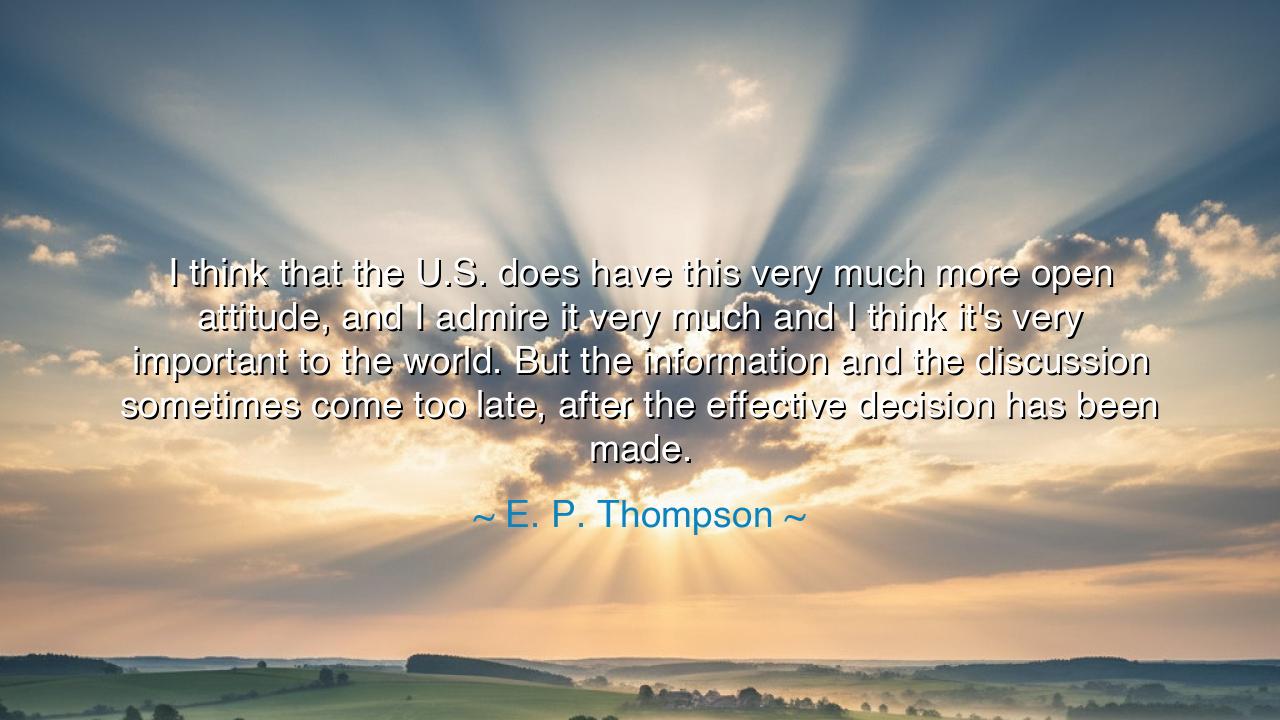
I think that the U.S. does have this very much more open
I think that the U.S. does have this very much more open attitude, and I admire it very much and I think it's very important to the world. But the information and the discussion sometimes come too late, after the effective decision has been made.






Host: The room was quiet, with only the soft sound of the evening breeze through the window breaking the stillness. Jack sat near the window, his arms crossed, staring out into the dimming light. Jeeny, across from him, sat with a book in her lap, but her gaze was lost in thought. The peace between them was unspoken, but there was a quiet understanding that something deeper was waiting to be explored.
Host: E. P. Thompson’s words broke the silence: “I think that the U.S. does have this very much more open attitude, and I admire it very much and I think it's very important to the world. But the information and the discussion sometimes come too late, after the effective decision has been made.” The simplicity of the statement, paired with its reflection on timing, transparency, and decision-making, felt both relevant and critical. Jack, who often looked at things with a more analytical perspective, was the first to speak.
Jack: His voice was reflective, as if trying to unpack the layers of Thompson’s words: “I get that. It’s like we often praise open discussions, especially in democratic societies like the U.S., for encouraging free speech and transparency. But the key issue Thompson is highlighting is timing. By the time the debate happens, the decision has already been made, and that’s where it’s problematic, right? The real decisions are often made behind closed doors before the public ever gets a chance to weigh in.”
Jeeny: She nodded, her voice calm, but thoughtful: “Exactly. It’s one thing to have an open attitude, to encourage discussion and debate, but it’s something else entirely for that discussion to be meaningful. If the decision-making process has already moved ahead by the time the public is involved, it’s almost as though the conversation is just a formality. The real impact is lost because the crucial decisions were made without enough input or foresight.”
Host: There was a subtle shift in the room as the weight of Thompson’s observation settled in. The idea that transparency and openness were sometimes undermined by timing—that the public’s voice came too late—felt both significant and troubling. Jack’s usual perspective on open dialogue seemed to evolve, as he realized that the value of public discussion was tied not only to its existence but to its timing—to the space given for real influence before decisions were made.
Jack: His voice softened, almost resigned: “I think that’s the problem we run into sometimes. We think we’re being given the opportunity to speak, to influence, but if those decisions are already in motion, what good is the discussion? It’s like closure after the fact, not an actual dialogue that can shift the course of things. It makes the process feel like it’s just for show, a way of saying we’re open when in reality, the important decisions have already been made.”
Jeeny: Her expression softened, a slight frown on her face as she considered the truth in what Jack had said: “Exactly. It’s like the system creates an illusion of openness, but if the decisions are made too far in advance, by the time we have a chance to discuss them, it’s already too late to change the outcome. That’s where we see the real disconnect—between the ideals of transparency and the reality of influence. People want to be heard, but if the channels are only open after the fact, it undermines the entire process.”
Host: The room seemed to grow quieter, the weight of their words settling in. The idea that transparency and open discussion, while important, could be rendered ineffective if they came too late in the decision-making process, felt like a sobering truth. Jack and Jeeny sat together, understanding that meaningful dialogue required not just openness but the timing to truly make an impact, to shape decisions before they were set in stone.
Jack: His voice was quieter now, almost reflective: “Maybe the real challenge is making sure that discussion doesn’t just become a checkbox after the fact. It has to be part of the decision-making process, part of how things are shaped before they’re final. Otherwise, it’s like we’re playing catch-up, and that’s not the way to truly be engaged.”
Jeeny: She smiled softly, her voice filled with understanding: “Exactly. It’s about giving people the chance to have an impact while things are still in motion, while decisions can still be shaped by collective input. That’s how we create true change, not by waiting until the decision is done and dusted.”
Host: The evening stretched on, but the world outside felt distant. Inside, Jack and Jeeny sat in the quiet realization that openness and timing were not just ideals to be aspired to—they were essential elements of meaningful engagement. Public discourse, to truly be effective, needed to happen before decisions were final, not after. And in that understanding, there was a quiet determination—a reminder that for real change to happen, we must not only speak, but speak in time.






AAdministratorAdministrator
Welcome, honored guests. Please leave a comment, we will respond soon